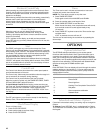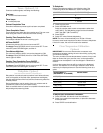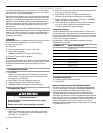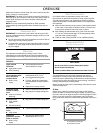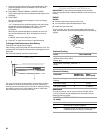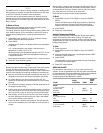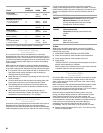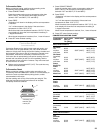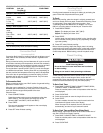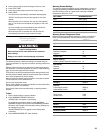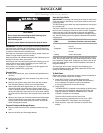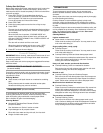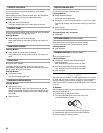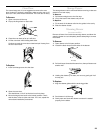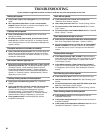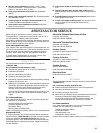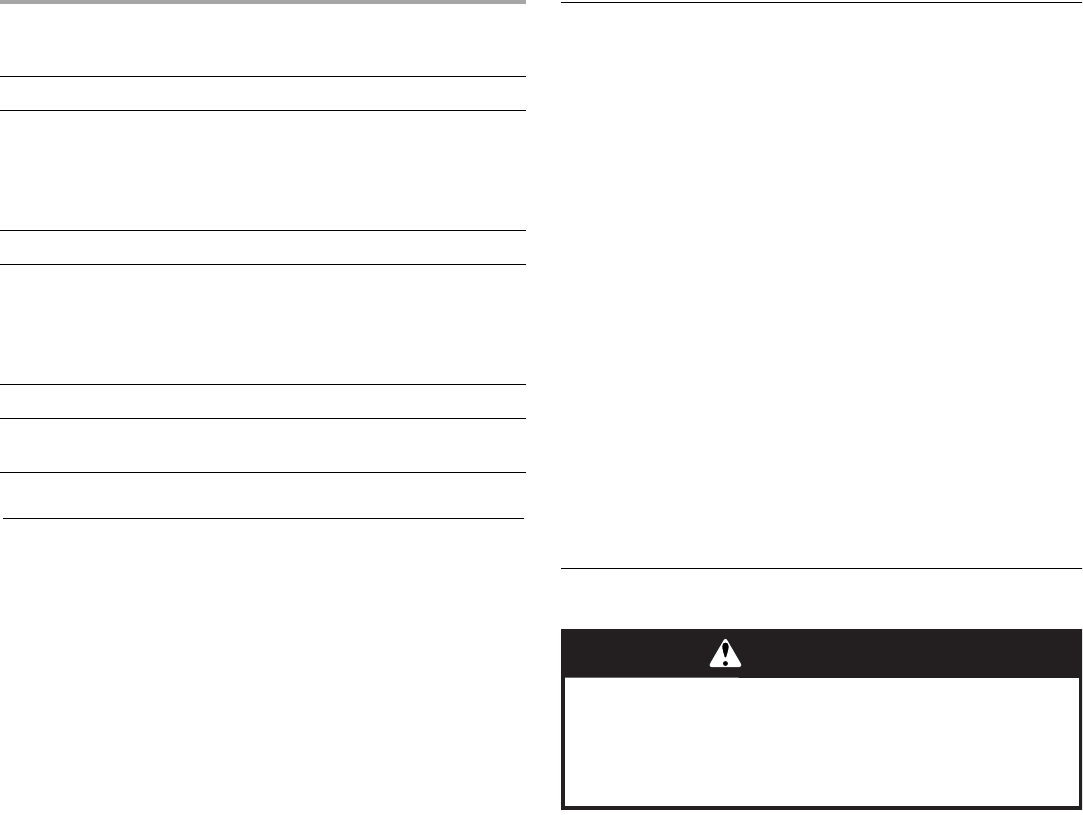
24
Convection Broil
(on some models)
Convection Broil is ideal for cooking foods such as thinner cuts of
meat; filets of fish; boneless, skinless chicken; vegetables and
garlic bread.
During convection broiling, the broil elements will cycle on and off
in intervals to maintain oven temperature, while the fan constantly
circulates the hot air. The circulating air creates a seal on all sides
of the food so that turning of foods is often not necessary.
The temperature is preset at 450°F (232°C), but can be changed
to a different temperature. Cooking times will vary depending on
the rack position and temperature and may need to be adjusted.
If the oven door is opened during convection broiling, the broil
elements and fan will turn off after 30 seconds. They will come
back on once the door is closed.
To Convection Broil:
Before convection broiling, see “Broil” section for general broiling
guidelines. Position rack.
Allow the oven to preheat for 5 minutes. Position food on the
unheated grid on the broiler pan, then place it in the center of the
oven rack with the longest side parallel to the door.
Close the door.
1. Press CONVECT BROIL.
Press the number pads to enter a temperature other than
500°F (260°C). The convection broil range can be set
between 300°F and 500°F (149°C and 260°C).
2. Press START.
The set oven temperature will appear on the oven display
until oven is turned off.
3. Press OFF when finished cooking.
Proofing Bread
(on some models)
Proofing bread prepares the dough for baking by activating the
yeast. Follow the recipe directions as a guide.
To Proof:
Before first proofing, place the dough in a lightly greased bowl
and cover loosely with wax paper, coated with shortening. Place
on rack guide 2, then place broiler pan on guide 1. See
“Positioning Racks and Bakeware” for diagram. Put 2 cups
(500 mL) of boiling water in the broiler pan. Close the door.
1. Press BREAD PROOF.
Style 1: The display will show 100°F (38°C).
Style 2: The display will show “brd.”
2. Press START.
Let the dough rise until nearly doubled in size, checking after
20-25 minutes. Proofing time may vary depending on dough
type and quantity.
3. Press OFF when finished proofing.
Before second proofing, shape the dough, place it in baking
pan(s) and cover loosely with plastic wrap, coated with cooking
spray. Follow the same placement, broiler pan and water and
control steps above. Before baking, remove the plastic wrap.
Timed Cooking
Timed Cooking allows the oven to be set to turn on at a certain
time of day, cook for a set length of time, and/or shut off
automatically. Delay start should not be used for food such as
breads and cakes because they may not bake properly.
To Set a Cook Time:
1. Press BAKE, CONVECT BAKE, CONVECT ROAST, BROIL,
CONVECT BROIL, or BREAD PROOF.
Press the number pads to enter a temperature other than the
one displayed.
2. Press COOK TIME.
3. Press number pads to enter the length of time to cook.
4. Press START.
On some models, the start time, stop time and cook time
countdown will appear on the oven display.
When the stop time is reached, the oven will shut off
automatically, and end-of-cycle tones will sound.
To Set a Cook Time and Stop Time (Delay Start):
Before setting, make sure the clock is set to the correct time of
day. See “Clock/Timer Display” section.
1. Press BAKE, CONVECT BAKE or CONVECT ROAST.
Press the number pads to enter a temperature other than the
one displayed.
2. Press COOK TIME.
Chicken*, Rack Position 2
Whole
3-5 lbs
(1.5-2.2 kg)
5-7 lbs
(2.2-3.1 kg)
20-25
15-20
325°F (163°C)
325°F (163°C)
180°F (82°C)
180°F (82°C)
Turkey*, Rack Positions 1 or 2
13 lbs and
under
(5.85 kg)
Over 13 lbs
(5.85 kg)
10-15
10-12
300°F (149°C)
300°F (149°C)
180°F (82°C)
180°F (82°C)
Cornish Game Hens*, Rack Position 2 or 3
1-1.5 lbs
(0.5-0.7 kg)
50-60 325°F (163°C) 180°F (82°C)
*Do not stuff poultry when convection roasting.
FOOD/RACK
POSITION
COOK TIME
(min. per
1 lb [454 g])
OVEN TEMP. INTERNAL
FOOD TEMP.
WARNING
Food Poisoning Hazard
Do not let food sit in oven more than one hour before
or after cooking.
Doing so can result in food poisoning or sickness.



